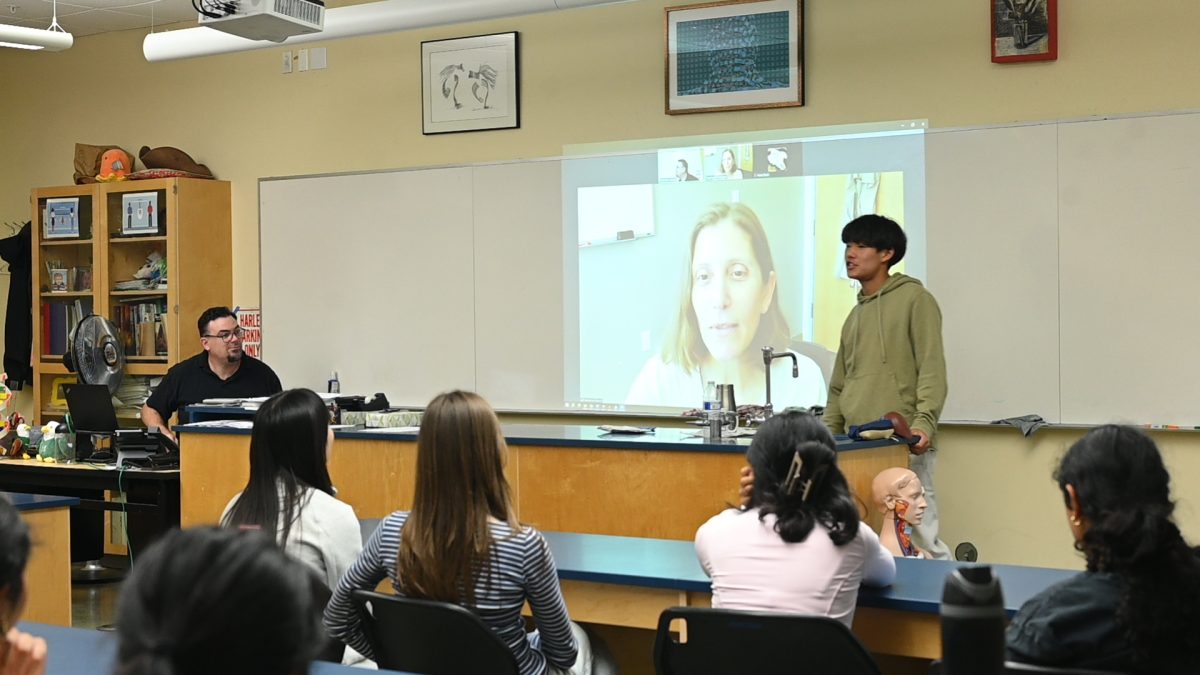Achoo!
As spring goes into full swing, many students begin to experience seasonal allergies, commonly known as hay fever.
March 28, 2017
March 20 marked the first day of spring, a season filled with blooming flowers, comfortable temperatures, and lush green grass. But for many, this seemingly pleasant time of year is overshadowed by the onset of sniffling, sneezing and itchy eyes.
Most commonly referred to as hay fever, seasonal allergic reactions are induced by increased pollen count in the air, which causes the immune system to react negatively.
For students suffering from allergies, upper school nurse Claire Elchert keeps a high-efficiency particulate arrestance (HEPA) filter in her office.
“With the weather pattern and with the springtime, this week in particular, everybody’s allergies have kicked up, students and adults alike,” she said. “[The HEPA filter] is a machine that takes particulate out of the air, so I keep that running Monday through Friday just to keep the allergens in the air in the room down, and it really is helpful sometimes for a student to just kind of rest here for a while.”
Many students, such as Andy Koonmen (10), are heavily affected by seasonal allergies during spring. Andy mainly experiences a runny nose.
“I think Harker does a very good job with it because they have a good maintenance staff that make sure that everything is clean in the classrooms, which helps a lot,” he said. “I have not had many as bad allergies as at my old school than Harker.”
Over the counter medicines such as Claritin, Zyrtec and Allegra, known as oral antihistamines, can alleviate symptoms such as sneezing and itching, while other medicines reduce nasal congestion.
“[These medicines] all have their place in treating allergies, and sometimes you have to use multiple medications to control your symptoms,” fellow of the American Academy of Allergy Asthma and Immunology Dr. Jennifer Namazy said.
Dr. Namazy also recommends that seasonal allergy sufferers keep track of pollen counts.
“There’s not so much you can do to avoid pollen,” she said. “Try to avoid spending a lot of time outdoors on those high pollen count days. Maybe not go hiking or running outside, rather go running inside.”
This piece was originally published in the pages of The Winged Post on March 28, 2017.


















![“[Building nerf blasters] became this outlet of creativity for me that hasn't been matched by anything else. The process [of] making a build complete to your desire is such a painstakingly difficult process, but I've had to learn from [the skills needed from] soldering to proper painting. There's so many different options for everything, if you think about it, it exists. The best part is [that] if it doesn't exist, you can build it yourself," Ishaan Parate said.](https://harkeraquila.com/wp-content/uploads/2022/08/DSC_8149-900x604.jpg)




![“When I came into high school, I was ready to be a follower. But DECA was a game changer for me. It helped me overcome my fear of public speaking, and it's played such a major role in who I've become today. To be able to successfully lead a chapter of 150 students, an officer team and be one of the upperclassmen I once really admired is something I'm [really] proud of,” Anvitha Tummala ('21) said.](https://harkeraquila.com/wp-content/uploads/2021/07/Screen-Shot-2021-07-25-at-9.50.05-AM-900x594.png)







![“I think getting up in the morning and having a sense of purpose [is exciting]. I think without a certain amount of drive, life is kind of obsolete and mundane, and I think having that every single day is what makes each day unique and kind of makes life exciting,” Neymika Jain (12) said.](https://harkeraquila.com/wp-content/uploads/2017/06/Screen-Shot-2017-06-03-at-4.54.16-PM.png)








![“My slogan is ‘slow feet, don’t eat, and I’m hungry.’ You need to run fast to get where you are–you aren't going to get those championships if you aren't fast,” Angel Cervantes (12) said. “I want to do well in school on my tests and in track and win championships for my team. I live by that, [and] I can do that anywhere: in the classroom or on the field.”](https://harkeraquila.com/wp-content/uploads/2018/06/DSC5146-900x601.jpg)
![“[Volleyball has] taught me how to fall correctly, and another thing it taught is that you don’t have to be the best at something to be good at it. If you just hit the ball in a smart way, then it still scores points and you’re good at it. You could be a background player and still make a much bigger impact on the team than you would think,” Anya Gert (’20) said.](https://harkeraquila.com/wp-content/uploads/2020/06/AnnaGert_JinTuan_HoHPhotoEdited-600x900.jpeg)

![“I'm not nearly there yet, but [my confidence has] definitely been getting better since I was pretty shy and timid coming into Harker my freshman year. I know that there's a lot of people that are really confident in what they do, and I really admire them. Everyone's so driven and that has really pushed me to kind of try to find my own place in high school and be more confident,” Alyssa Huang (’20) said.](https://harkeraquila.com/wp-content/uploads/2020/06/AlyssaHuang_EmilyChen_HoHPhoto-900x749.jpeg)





![LALC Vice President of External Affairs Raeanne Li (11) explains the International Phonetic Alphabet to attendees. "We decided to have more fun topics this year instead of just talking about the same things every year so our older members can also [enjoy],” Raeanne said.](https://harkeraquila.com/wp-content/uploads/2025/10/DSC_4627-1200x795.jpg)




